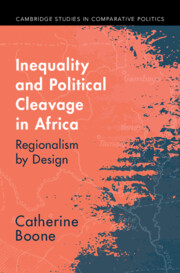'African politics is often reduced to primordial ethnic affiliations tempered by electoral patronage. This book effectively challenges this conventional wisdom by adopting and refining an approach to political affiliations first developed to understand European and US politics as involving socioeconomic cleavages (including ethnic ones) refracted through regional and local lenses. Africa turns out to be less distinctive after all.'
John Agnew - Professor of Geography, University of California, Los Angeles, co-author of Mapping Populism: Taking Politics to the People
'Inequality and Political Cleavage in Africa is a major contribution. By analyzing postcolonial African politics through the lenses of economic and political geography, it re-interprets the role of ethnicity and center–periphery relations in shaping representation, coalition formation, ethnic politics, and redistribution in Africa. Along the way it pushes us to rethink the links between economic geography and political development more generally and, like all great books, invites new and more challenging questions. A must-read.'
Pablo Beramendi - Professor of Political Science, Duke University
'By arguing that territory rather than ethnicity holds the key for understanding national politics in Africa, this powerful book challenges much of the recent literature on this topic. In so doing, it also builds important bridges not just to other regions in the global south like Latin America, but to countries such as the US where territorial cleavages are intensifying.'
Kent Eaton - Distinguished Professor of Politics, University of California, Santa Cruz
'This book is not just path-breaking; it’s shapeshifting. It presents a bold argument that spatial inequality and regional economic differences, not ethnic identities, shape local and national political dynamics across Africa. The theory is elegant; the research is meticulous; and the book’s findings will convince scholars to take seriously the relationship between regional economic variation and political power on the continent.'
M. Anne Pitcher - Joel Samoff Collegiate Professor of Political Science and Afroamerican and African Studies, University of Michigan
'This outstanding book provides a compelling alternative account of enduring political dynamics in sub-Saharan Africa. While most research argues ethnicity drives politics in the region, Catherine Boone shows convincingly that spatial inequalities structure political competition, much as they do in other parts of the world. This is a must-read for all scholars of comparative politics.'
Melissa Rogers - Co-director, Inequality and Policy Research Center, Claremont Graduate University
'This outstanding book convincingly shows how regional identities, intertwined with economic inequality, define African politics. This persuasive and original argument forces us to reconceptualize the organization of politics in many parts of the world beset with deep regional inequalities. It is a powerful riposte against the singular focus of ethnicity as determinative of political trends, not only in Africa but elsewhere.'
Pradeep Chhibber - Professor and Indo-American Community Chair in India Studies, University of California, Berkeley
‘This kind of focus on the territoriality of political and economic administration is rare in political science but Boone shows just how powerful it can be. If you buy the argument - and I do - this understanding either displaces or profoundly changes how we think about ethnicity and its supposedly defining political and economic role on the continent. Boone makes very clever use of data. Her argument is enhanced also by her encyclopedic knowledge of cases.’
Antoinette Handley - University of Toronto
‘This is a big book that promises to have a major impact. The book seems well positioned to shake up, disrupt in tech speak, the political science literature on Africa. Among other remarkable strengths, the book offers exciting new data on regional voting patterns; broad and deep coverage of colonial period and the inequalities it created; and a convincing critique of micro, clientelist, ethnic approaches.’
Ben Schneider - Massachusetts Institute of Technology
‘agenda-setting … path-breaking’
Kent Eaton
Source: The Journal of Development Studies



